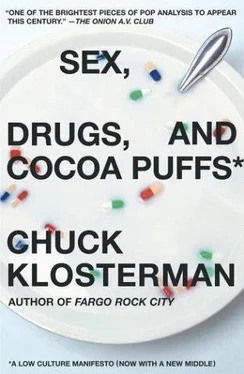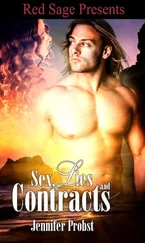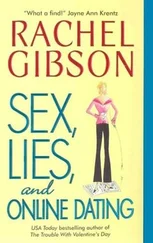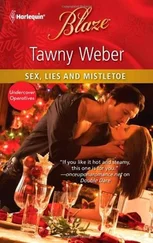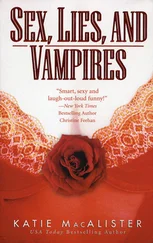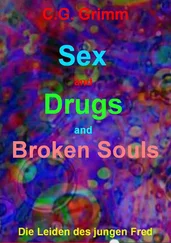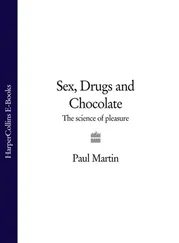When we leave from Dischner’s house at 12:30 A.M., it has already been an incredibly long day for Trask. He awoke Friday morning at 2:00 A.M. at his home in Ravenna, Ohio, and immediately drove four hours to the outskirts of Cincinnati, where he spent the day cutting down a troublesome tree in Dischner’s front yard; Trask’s father runs a tree service in Northeast Ohio, so his son knows how to handle a chainsaw. After a brief afternoon nap, the band hooked up for a few hours of rehearsal before supper. Now it’s midnight, and Trask is preparing to drive the entire way to Virginia, nonstop. I have never met anyone who needs sleep less. Trask once drove twenty-two hours straight to Hayes, Kansas, and played a show immediately upon arrival. If the real Axl Rose had this kind of focus, Guns N’ Roses would have released fifteen albums by now.
There was a time when Paradise City had a tour bus, but they lost it last summer. This is not a euphemism; they literally can’t find it. It broke down on a trip to Kansas City, and they had to leave it in a Missouri garage to make it to the club on time. Somehow, they lost the business card of the garage and have never been able to recall its location. Dischner tells me this story three times before I realize he’s not joking.
“We drove back through Missouri a bunch of times, we put up a picture on our Web site, and we even called the Highway Patrol,” Dischner says. “But we lost the bus. And I guess there’s some law that states you only have thirty days to find your bus.”
As it is, the band is now traveling in two vehicles. Axl/Randy will pull the Haulmark trailer that contains their gear; he’ll drive the truck, I’ll ride shotgun, and Izzy/Paul will curl up in the extended cab. A friend of the band—some dude named Teddy—will follow in his Ford Mustang, which will also hold Slash/Bobby and Steven/Rob. The pickup box is covered with a topper, so Duff/Spike will lay back in the truck bed with Punky.
Trask and Dischner do not know who Punky is.
They’ve only met Punky a few times, and they don’t know his last name (or his real first name). They are told that Punky is friends with Teddy and Young, all of whom are evidently longtime running buddies. Young is thirty-six, which is a little older than Trask (twenty-eight), Dischner (thirty-one), and Pohlman (twenty-nine). Nobody knows how old Spike is and he refuses to say; a good guess might be forty.
Our last stop before hitting the highway is Spike’s home in Clifton, Ohio, a few scant miles from the site of Cincinnati’s recent race riots. Spike’s house is terrifying. It appears completely dilapidated, but—supposedly—it’s actually being renovated. The home contains a python, several large birds, two alligators in the bathtub, and the most bloodthirsty Rottweiler in North America (Dischner gives me four full minutes of instruction about how to safely walk past this animal). Spike deals exotic animals in his spare time; nobody but me seems to find this unusual.
At departure time, only 40 percent of the band is not under the influence of some kind of chemical. Twenty minutes into the trip, that percentage will fall to zero. Even before we get on the road, this Punky character looks drunk enough to die; amazingly, he’s just getting started. They’re all just getting started. Everyone is smoking pot, and it’s the second-strongest dope I’ve ever inhaled: I keep looking through the windshield, and the vehicle seems to be moving much faster than it should be. It feels like we’re driving down an extremely steep incline, but the earth remains flat. I am not the type who normally gets paranoid, but this is a bit disturbing. I’m trying very hard to act cool, but I start thinking too much; in order to relax, I smoke another half joint, which (of course) never works. I start imaging that we’re going to crash and that my death is going to be reported as some sort of predictable irony—I will forever be remembered as the guy who wrote a book about heavy metal bands who were mostly fake and then died while touring with a heavy metal band that was completely fake. I start having hallucinations of elk running out in front of the vehicle, and I notice that Trask isn’t even watching the road when he talks to me. Finally, I can’t take it anymore. I politely turn to Trask and Dischner and make the following announcement: “Okay—now, don’t take this the wrong way, because I’m probably just nuts, and I’m probably just too fucked up to know what’s going on, and I’m probably overreacting for no valid reason, and I hate to sound unreasonable or immature, and I don’t want to sound pretentious, but elks are prevalent. And perhaps this is out of line and I’m certainly open to debate on this issue, but I need to go on record and say that I am not 100 percent comfortable with the situation regarding this truck at the moment, because I have a feeling that we are all going to die.”
“Dude,” Trask tells me. “I totally wish I could trade bodies with you right now.”
It remains to be seen if these guys can sound like Guns N’ Roses, but they clearly have their self-destructive aspirations deftly mastered.
Our vehicles barrel into the darkness of Kentucky, loaded like a freight train and flyin’ like an aero-plane. Spike and Punky are freezing in the box of the pickup, and they try to stay warm by drinking more Bud Lite. Inside the toasty cab, faux-Axl and faux-Izzy have straightened up (slightly), and we’re discussing the question most people have about tribute bands, which is “Why do you possibly do this?” It seems antithetical to the whole concept of art; the notion of creativity has been completely removed from the equation. Wouldn’t the members of Paradise City be happier if they could write their own songs, dress however they want, and—quite simply—be themselves?
No.
“Obviously, being in an original band is the ultimate dream, but it mostly sucks,” Dischner says. “You don’t get to tour. You don’t get no money. You have to beg your own friends to come to the show. But being a mock star is awesome.”
Paradise City will earn $1,100 for the Harrisonburg show. After their manager takes his 15 percent and they pay for gas and promotions, they will be left with $655, which—split between five people—ends up being $131 each. This is almost nothing. But the operative word is “almost.” If these same five guys in Paradise City performed their own material, they would have to pay to play in most reputable clubs; as a tribute band, they can live as “professional musicians.” Relatively speaking, $1,100 is good money.
“The thing about being in a tribute band is that your fans already exist,” Trask says. “You show up at the bar, and there’s immediately a few hundred people who love Guns N’ Roses and therefore love you.”
This is not always true. A month later, Paradise City will play a show at a club called Dr. Feelgood’s in the desperate lake town of Conneaut, Ohio, and virtually no one will notice; the bar’s billiard tables will have more spectators than the stage, and the owner won’t even give them free beer until they finish the first set. It’s a bit uncomfortable for everyone involved, but not really humbling or tragic: No one in Paradise City seems confused about the social significance of this group.
“I never think of myself as Axl Rose, and we don’t think of ourselves as Guns N’ Roses,” Trask says. “Our fans are Guns N’ Roses fans—they’re not really fans of Paradise City. We’re not deluding ourselves.”
And in a way, somber nights in ghost towns like Conneaut validate their cred; Paradise City almost seems to enjoy adversity. They love talking about how “life on the road” is a hard-yet-satisfying experience. They give “tribute quotes” that sound like outtakes from VH1’s Behind the Music : It’s all about the fans, it’s all about the music, it’s all about the awe-inspiring majesty of rock; it’s all about something, and then it’s all about something else entirely. But they’re never lying—in tribute bands, all those clichés are true. Paradise City cares more about Guns N’ Roses than the original members of Guns N’ Roses care about the song “Paradise City.”
Читать дальше
